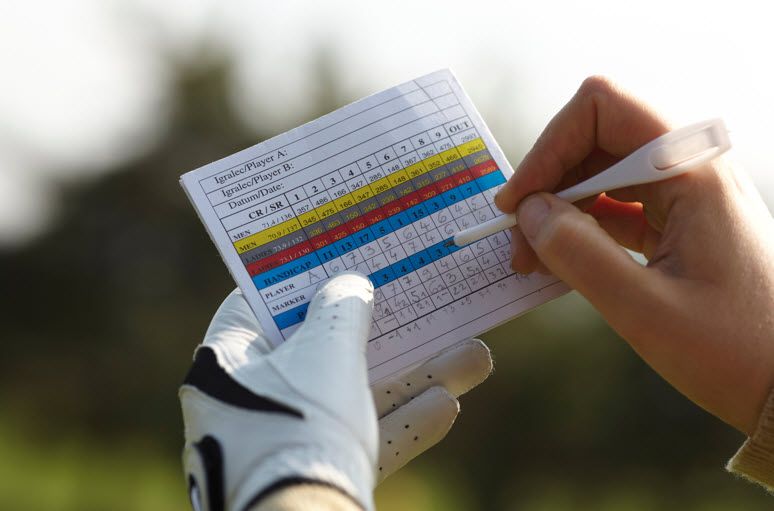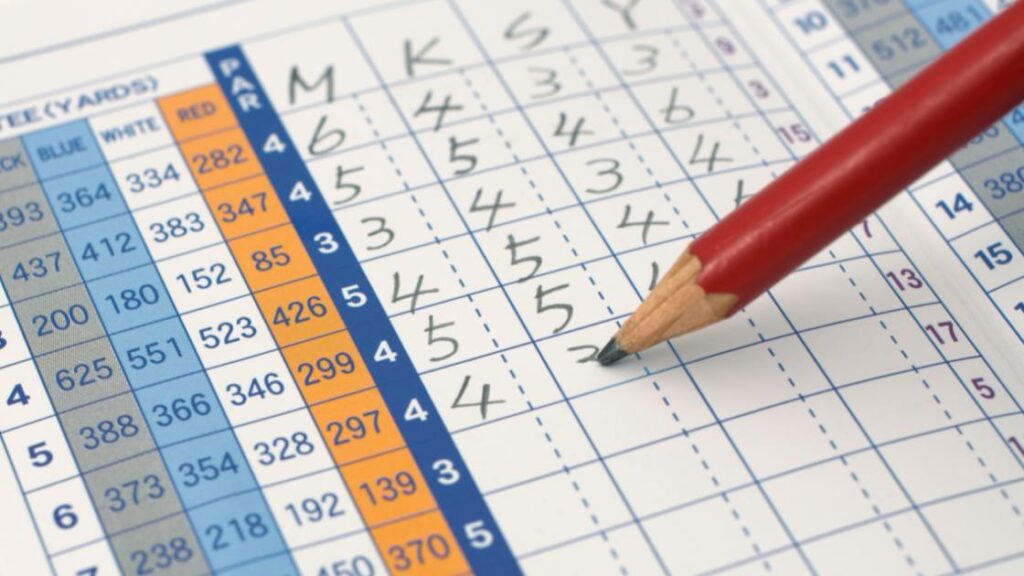Do you know what constitutes a good score in golf for 18 holes?
Well, here’s an interesting fact for you: the average score for amateur golfers is around 100 strokes.
But don’t worry, with a little practice and some helpful tips, you can improve your score and achieve the freedom to celebrate a great round on the course.
In this article, we’ll explore the factors that affect your golf score and provide benchmarks to strive for.
So, let’s dive in and start shooting for that impressive score!
Understanding Golf Scoring

Golf scoring is a nuanced aspect of the game that varies greatly from player to player. What constitutes a good score for 18 holes largely depends on individual skill level, the difficulty of the course being played, and personal goals.
Generally speaking, for amateur golfers, a score of 90 or below is often seen as a good score.
However, average scores for amateur golfers can range from around 90 to 100 strokes depending on various factors including the course conditions and the golfer’s experience.
This means that a good score can be quite subjective, embodying personal achievements and improvements over time.
Factors Affecting Your Golf Score
Your golf score can be influenced by various factors such as weather conditions, course difficulty, and your level of physical fitness. Understanding these factors is crucial for improving your game and achieving the score you desire.
Let’s delve into the details:
- Weather conditions: The weather plays a significant role in the game of golf. Wind can alter the trajectory of your shots, rain can affect your grip and the course’s playability, while extreme temperatures can impact your stamina and concentration. Understanding and adapting to weather conditions is a hallmark of a seasoned golfer.
- Course difficulty: Each golf course has its own set of challenges, including the layout, hazards, and green speed. The more challenging the course, the more skill and strategy it requires to navigate successfully.
- Physical fitness: Golf may seem like a leisurely sport, but physical fitness plays a crucial role. Strength, flexibility, and endurance are essential for executing powerful swings, maintaining consistency throughout the round, and preventing injuries. A regular fitness routine can translate to improved performance on the course.
Benchmarks for a Good Golf Score

In golf, there are benchmarks that can help you determine what constitutes a good score for 18 holes. Generally, shooting a score below 100 is considered good for beginners, while intermediate players strive for scores in the 90s.
As you progress and become more skilled, breaking 80 is seen as an accomplishment.
The table below further categorizes different golf scores and their corresponding skill levels:
| Golf Score | Skill Level |
|---|---|
| 70-80 | Professional |
| 80-90 | Advanced |
| 90-100 | Intermediate |
| 100+ | Beginner |
It’s important to note that these benchmarks aren’t absolute and can vary depending on factors such as course difficulty and playing conditions.
Tips to Improve Your Golf Score
Improving your golf score requires a blend of practice, strategy, and mental preparation. Here are some expanded tips to help you on this journey:
- Develop a solid pre-shot routine: A consistent routine before each shot can help maintain focus and ensure that you are well-prepared for the shot ahead. This includes visualizing your shot, choosing the right club, and ensuring a smooth swing.
- Practice your short game: A significant portion of shots in a round of golf are taken within 100 yards of the green. Honing your chipping, pitching, and putting skills can drastically lower your score.
- Manage your course strategy: Smart decision-making on the course is crucial. Instead of always going for the longest shot, consider the hazards, wind direction, and positioning to make smart decisions that set you up for success.
- Continuous Learning: Stay updated with new techniques, equipment, and strategies in golf. Learning is a continuous process, and staying abreast of new developments in the golf world can provide you with additional insights to improve your game.
Conclusion
In conclusion, understanding golf scoring terms and the factors that affect your golf score is crucial in determining what constitutes a good score for 18 holes.
By setting benchmarks and implementing tips to improve your score, you can celebrate achieving a great golf score.
So, grab your clubs, hit the green, and strive for a score that showcases your skill and dedication to the game.


what is slop ?
Hey Jeff,
Are you talking about slope? The Slope Rating of a golf course gives you an idea of how tough it is for an average player (around a 20 handicap for male golfers) compared to a scratch player. The steeper the slope rating, the tougher it gets for a bogey golfer compared to a scratch golfer on the course.
I hope this helps! 🙂
Linda
What score should a female intermediate golfer strive for based on a range of slopes and rating? My regular course is 70.9/120, yardage 5262.
Hi Linda (Love The Name!!),
Great question! The score an intermediate golfer should aim for can vary widely based on the course difficulty, personal skill level, and the conditions on the day. However, given the details of your regular course, we can provide a rough guideline.
A course rating of 70.9 suggests that a scratch golfer (a player with a handicap of 0) might expect to shoot around 71 on average. The slope rating of 120 gives us a hint about the course’s difficulty for bogey golfers compared to scratch golfers.
For an intermediate female golfer, breaking 100 is often a solid goal, and as skills improve, breaking 90 or even 85 becomes a great next target. On a course with your specifications, aiming for a score in the low 90s or high 80s could be a good benchmark. Of course, the best way to determine your personal goal is to track your scores over time, identify areas for improvement, and set realistic, achievable targets based on your progress.
It’s also worth considering getting a handicap index if you don’t already have one, as it can provide a more personalized benchmark based on your past performance.
Thanks for the thought-provoking question, and keep swinging!
Warm wishes,
Linda